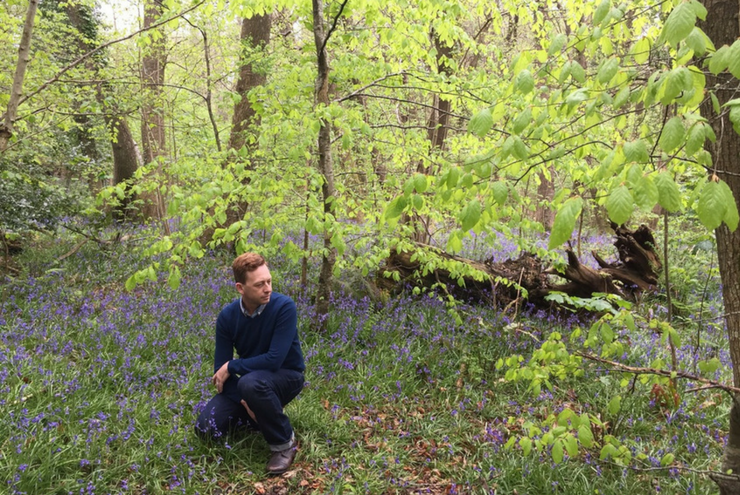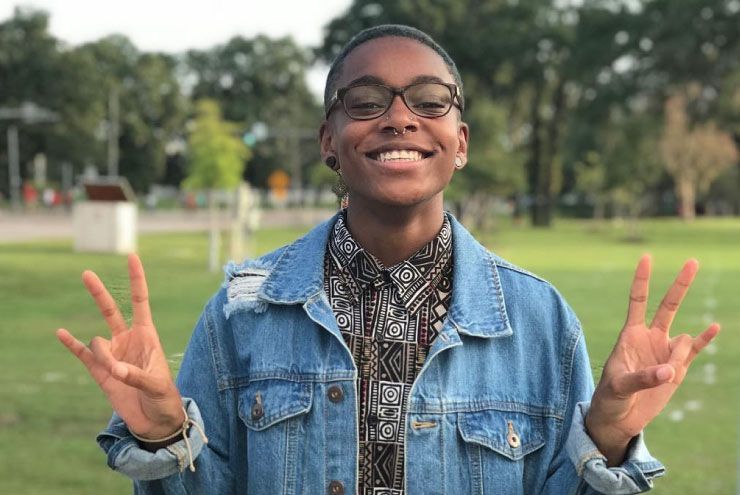By Josh Inocéncio
“This is probably the gayborhood of Berea,” grins Silas House, pointing to the Pride flags billowing from front porches on a tiny street in this small Kentucky college town.
Arguably the most prolific gay novelist in Appalachia, House was born and raised in nearby Laurel County. Educated at Eastern Kentucky University and then Spalding University for a Master of Fine Arts in creative writing, he now teaches at Berea College, the first desegregated and coeducational college in the South.
As per southern customs, we didn’t rush the interview when I arrived at his home to discuss his work. House’s husband, Jason Howard—who is also a prominent Kentucky writer—joined us on the front porch. It’s July 3rd, which is not only my birthday, but House and Howard’s wedding anniversary, too. Over coffee, we swapped tales about our families in Laurel County and coming out as gay after strict Pentecostal upbringings.
When we do venture inside for the interview, we sit at a long wooden table—next to which is a sign that reads, “Think Globally, Act Hillbilly.” House tells me it’s a gift from a friend who brought it to him from a citywide campaign in Nashville. With that motto overlooking our conversation, we traverse House’s writing career, which spans 16 years with multiple awards and best sellers.
“My first three novels are very Appalachian,” says House, in his rich drawl. “[That series is] about a family, going back to the late 1800s and into the 20th century. It’s about environmental problems like coal mining and the issue of leaving versus staying, which is huge for Appalachian people.”
In 2001, House emerged into the national literary scene with Clay’s Quilt. The novel is now part of trilogy that includes A Parchment of Leaves and The Coal Tattoo. While fictional, his work is deeply rooted in eastern Kentucky and the issues—both political and personal—that people face. Because he passionately represents folks in Appalachia, House has accrued quite the local following.
However, as he’s written more controversial work, reactions to his writing have changed. “Those first three novels are so embraced back home, but not the newest ones,” he says, referring to the shift to social justice-oriented topics with his young adult novels Eli the Good and Same Sun Here. “I think I became more suspect with the next three books, because I was challenging a lot of pre-established things here.”
As House says, he wrote Eli in response to 9/11 because he was frustrated with how narrowly people defined patriotism in the wake of the attacks. “This idea that you could just slap a sticker on your car and call yourself a patriot just enraged me,” he says. “So the novel deals with service and how there is more than one way you can serve your country.”
His upcoming novel Southernmost, which will be published in June 2018, is his first explicitly gay Appalachian novel. The story follows a fundamentalist preacher who disowns his brother when he comes out as gay, but steadily alters his views in the years after his brother disappears to Key West. “I’m exploring how the South is changing, but struggling with that change,” says House, noting that all his work, at the core, deals with identity, family, and belief.
And as is true in southern tradition, House grew up not only around people who confront the changing tides of their beliefs, but in a community of storytellers. “The main reason I started writing was because I grew up around people who told stories all the time,” remembers House. “And I was really conscious of those stories being lost. After my uncle died, I realized how my family started changing stories about him. So I started writing stuff down.”
But House’s motive for writing is also about representation. “I couldn’t find my own people in literature. The only books about us were set in the Depression,” he says. “That’s when I wrote Clay’s Quilt, to give a contemporary look at Appalachia.”
With Clay’s Quilt, he reached his goal of publishing a novel before he turned 30, and the novel, which became a New York Times best seller, propelled him to national recognition.
“I was just country come to town. I had never been on an airplane and suddenly I was on this massive book tour,” he chuckles, as he remembers going to New York for the first time. “I was such a green horn. I can’t imagine some of the stuff I must’ve said. But I could see that I was a really authentic southern writer in that way.”
However, with House’s newfound fame in literary circles, he wrestled with staying rooted in the region that made him a writer. “In my culture, the cardinal sin is to ‘not get above your raisin.’ I’ve struggled to find that balance of being cosmopolitan and sophisticated but also retaining that rural point of view,” says House. “I’ve encountered a lot of people who discount me because of my accent. But I’ve also encountered a lot of anti-intellectualism here. So I often feel like a man with no country because I’m straddling both worlds. It’s frustrating.”
But living in this interstice between two societies is where House thrives as a writer. Growing up gay in a religious household and rural county gave him a measured distance from his community. “I think that every writer is a better writer if they’re an outsider,” says House. “Even when I wasn’t out, the way I looked at the world was shaped by being a gay man. And even though I didn’t leave here, I was apart from it in some way.” This solitude in his formative years, House argues, made him a writer.
And while practical reasons—such as his daughters from a former marriage and being an only child who wants to take care his parents—keep House in Kentucky, he’s still in love with the region despite all the challenges. “There’s something about the land that I’m homesick for when I’m away. I like the way people interact, the cadence of the language that I hear. There’s a comfort in home.”
“I was in Iceland recently and a woman asked me where I was from,” House recalls. “When I said Kentucky, she said ‘Oh, where all the best things in America come from. Like bourbon, whiskey, beautiful horses, and the music.’ And that really struck me because, in the rest of the world, Kentucky is seen as the best of the nation, but in the nation itself, we’re seen as the worst of it.”
“But,” he adds with a smile, “the rest of the world probably isn’t aware of how Kentucky votes.”
Alongside his writing, House speaks out frequently on political issues that affect the region. This year, he gave a speech at the Women’s March in Lexington, and he’s written op-eds on gay rights in Kentucky. He’s also quite vocal against mountain top removal, as detailed in his collection of oral histories Something’s Rising. And while House has lost readers because of his sexuality, he says more often people will write and say they’re not going to purchase his work anymore because he’s liberal.
Nonetheless, House isn’t ashamed of his sexuality or his political beliefs. And despite some hate mail, he’s received plenty of letters that read, “Thank you for being a gay person who has a public persona—there are so few Kentuckians like that.” This inspires him to be open about his sexuality while on his book tours.
During a reading at an elementary school in Madison County, a student asked House if he was married. When he replied he was, the boy asked what House’s wife’s name was. While in the past House has wrestled with how open he wants to be with his personal life, he responded to the student, “Well, I have a husband and his name is Jason.” Some of the children gasped and afterward House told their teacher, “You may get calls from some angry parents later.” But the teacher just smiled and said, “Too bad.”
“I want to normalize that,” House says, referring to coming out to his audiences so casually. “I also know normalization is a complicated term for gay people, because we don’t want to be normalized. But I do want to be seen as a human being.”
But in the classroom in Berea is where House often interacts directly with closeted Appalachian students seeking empowerment. “The biggest blessing of my teaching career is having students come to me and say, ‘I’m out here on campus. I want to be who I am back home, but I don’t know how,’” House says. “We have a lot to share culturally. They might have lots of professors who are allies, but they don’t talk the way that I talk.”
As a professor, House is the faculty advisor for Berea’s Harvey Milk Society, a student group that organizes protests and marches for LGBT rights. He also pushes his students to be proud of their southern roots. “I had professors who told me not to share that I was from Kentucky when I became a published writer,” he recalls. “So I teach my students they are not inferior, which the media teaches them all the time. And I show them that they have literature to be proud of. They’re often surprised to learn that an American masterpiece, The Dollmaker by Harriette Arnow, was written just a few counties over in Pulaski.”
Whether gay or southern or both, House strives to make students proud of being gay and Appalachian. He also pushes them to work together toward political change—especially those who wish to stay and thrive in Appalachia as openly queer folks. “One of the best things about being gay—and about being a gay southerner especially—is chosen family,” says House. “You have connections of culture, religiosity, and share a common experience. And we’ve got to work in ways, both blatant and subtle, to change things in the South.”
As we wrap up the interview, I glance once more over the sign, engulfed by House and Howard’s little bourbon bar, that reads “Think Globally, Act Hillbilly.” Armed with this phrase, we say our goodbyes, and, after a brief lunch at Noodle Nirvana where I tried House’s recommended off-the-menu “special,” I departed for Lexington.
To read more about Silas House and his work, check out his website.







